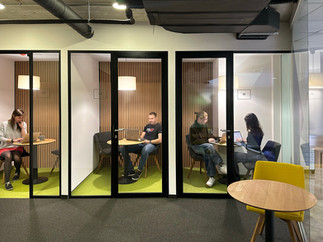The Quiet Power of Great Meeting Rooms
- Nov 25, 2025
- 3 min read
Updated: Dec 10, 2025

Why seamless logistics = sharper teams (and how we make it happen)
In most fast-growing companies, the meeting room is where it all happens - the deal-closing pitch, the critical one-on-one, the product decision that saves a sprint.
And yet, for many teams, it’s also where things quietly fall apart.
You’ve probably seen the signs:
A candidate left standing in the hallway because the room’s double-booked.
A client call where the screen won’t connect (and the tension slowly builds).
A Slack message that reads: “Where are we supposed to meet? There’s someone in our room.”
These aren’t just annoyances. They’re part of a deeper operational drag that slows down high-performing teams - and silently chips away at morale.
The Hidden Cost of Meeting Room Chaos
The data tells a clear story:
🔹 25–40% of meeting room bookings are ghost meetings - rooms that look “busy” in the calendar, but sit empty.
Source: Robin Powered, 2023 Workplace Report
🔹 40% of employees waste up to 30 minutes per day looking for an available space.
Source: Asure Software, 2024 Global Office Utilization Benchmark
🔹 34% feel less productive because of frequent meeting issues.
Source: Vyopta + Wakefield Research, 2024 Workplace Collaboration Report
The result?
Unnecessary frustration, fragmented attention, and a sense that the basics aren’t working - even when everything else is.
A Meeting Room Is a Business Tool
At Campus X, we treat meeting rooms not as furniture - but as infrastructure.
They’re not just there to “host” a meeting.
They should elevate it.
And when they don’t, the ripple effects are real:
Lost time
Weakened employer brand
Talent disengagement
Slower decisions
That’s why we built our meeting experience differently - designed for the speed, clarity, and predictability that scaleups need.
What We Do (So You Don’t Have To)
✅ Every meeting room is a managed service
Behind each room is a real team - making sure every cable, screen, AC unit and chair works. No one should have to troubleshoot before a pitch.
✅ Standardized setups = zero learning curve
No matter which room you enter, everything’s where it should be. Simple. Fast. Consistent.
✅ 15+ meeting rooms, 18+ pods
This scale lets teams book with confidence - even last minute. No need for awkward workarounds.
✅ Meeting pods take the pressure off
Short sync? Quick call? You don’t need a boardroom. Our pods are built for fast, focused conversations - without clogging the calendar.
✅ Tech that just works - every time
Forget the “can you hear me?” openers. Everything is tested and maintained regularly. Our baseline is: it works.
For Leaders: 4 Questions Worth Asking
Even if you’re not part of Campus X, these are worth bringing to your next ops or facilities meeting:
How many of your bookings are ghost meetings? Run a calendar audit - you might find invisible bottlenecks.
Are your spaces overbuilt or underutilized? Design for behavior, not just capacity.
Is someone responsible for your meeting experience? Not the furniture - the actual human experience. If no one owns it, no one improves it.
What’s the hidden cost of friction? From candidate impressions to internal velocity - it adds up fast.
In Brief
High-performing teams don’t just need good ideas and good people.
They need environments that stay out of the way.
That’s what great meeting infrastructure does:
It removes friction.
It saves focus.
It gives your people a smoother path to do their best work.
We built Campus X for that.
And if you ever want to feel what a seamless meeting room experience is like - you’re welcome to visit.
Written by Visibilio.ai
























Comments